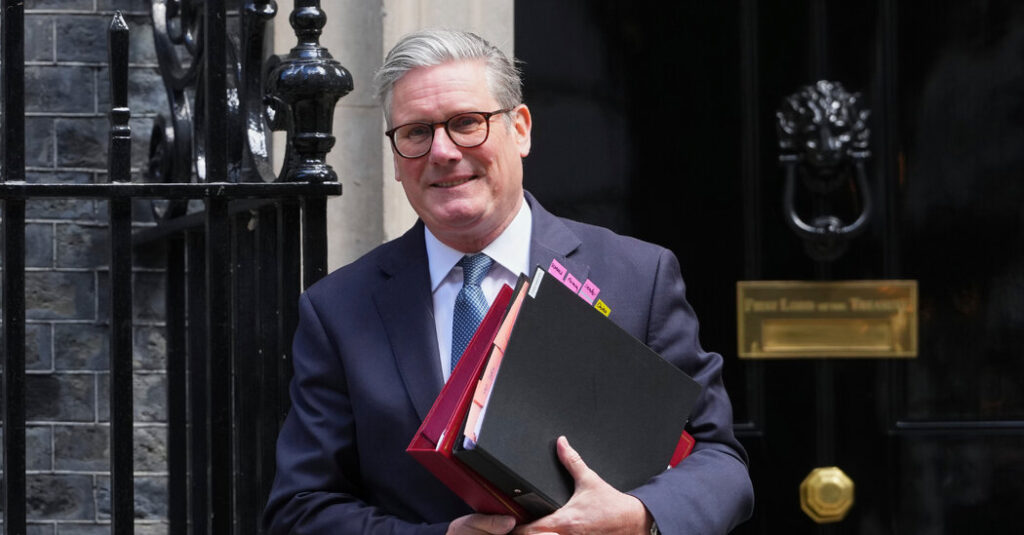For Prime Minister Keir Starmer of Britain, the news of an imminent trade agreement with the United States is a much-needed political victory, as well as vindication of his strategy of assiduously cultivating President Trump.
The details of the agreement were not yet clear and could prove contentious with farmers and other interest groups in Britain. Mr. Trump’s announcement on social media seemed to catch even senior British officials off guard, after weeks of negotiations characterized by two-steps-forward, one-step-back progress.
But that Britain is the first country in the world to conclude a deal with the United States after Mr. Trump imposed an across-the-board tariff of 10 percent on dozens of American trading partners seemed to affirm the “special relationship” often invoked by British and American diplomats.
In his post on Wednesday evening, Mr. Trump heralded a “MAJOR TRADE DEAL WITH REPRESENTATIVES OF A BIG, AND HIGHLY RESPECTED, COUNTRY.” He said the deal would be announced on Thursday morning in Washington.
Britain, even under a center-left Labour government, has escaped the harsh criticism that Mr. Trump has trained on the European Union and China, both of which he accuses of “ripping off” the United States in their trade relationships.
That partly reflects economics: Britain and the United States have reasonably balanced trade flows. Britain runs either an $89 billion trade surplus or a $14.5 billion deficit with the United States, depending on whether one cites British or American statistics.
The difference rests in part on how the two sides treat offshore financial centers like Jersey and Guernsey, which are semiautonomous. Crucially, trade in goods, with which Mr. Trump is most fixated, is relatively in balance.
But it also reflects Mr. Starmer’s tireless diplomatic outreach to Mr. Trump. In February, the prime minister turned up in the Oval Office with a letter from King Charles III, inviting Mr. Trump to make a rare second state visit to Britain. Mr. Starmer has stayed in touch with Mr. Trump since, speaking to him regularly by phone about pet issues like the president’s Trump Turnberry golf club in Scotland.
Mr. Starmer has steadfastly refused to criticize Mr. Trump, either on trade or his statements about Ukraine and its war with Russia. The prime minister has tried to act as a bridge between Europe and the United States, coaching President Volodymyr Zelensky of Ukraine on how to mend his rift with Mr. Trump after the two men clashed in an Oval Office several days after Mr. Starmer’s much friendlier visit.
Britain had other advantages in dealing with the United States. Its new ambassador to Washington, Peter Mandelson, had been a trade commissioner at the European Union and is steeped in the mechanics of trade negotiations.
But the British had to navigate the foibles of Trump administration, in which trade talks exist on two distinct levels: the substantive negotiations between teams at the United States Trade Representative and Britain’s trade ministry, and the whims of Mr. Trump, who seemed eager to announce a showcase deal but whose blessing was required before any agreement could be clinched.
At home, the deal could help buoy Britain’s sputtering confidence. Mr. Starmer has struggled with faltering economic growth, as well as straitened public finances, which have led his government into a series of unpopular moves, like curbing a subsidy to help older people pay their winter heating bills.
But the deal could also present Mr. Starmer with some hurdles, including to his efforts to reset trade relations with the European Union after Brexit. Some analysts have suggested that Britain will have to choose whether to align with the United States or Europe — something British officials dismiss as a false choice.
As the terms of the deal become clear, British farmers will be watching to see if their agricultural goods, notably chicken and beef, are protected from American imports. The government had drawn a red line against allowing imports of American “chlorinated” chicken or chemically treated beef.



